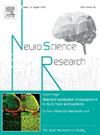高压氧预处理通过调节小胶质细胞的活化和极化,挽救长时间水下运动诱发的海马功能障碍
IF 2.4
4区 医学
Q3 NEUROSCIENCES
引用次数: 0
摘要
水下运动越来越普遍,在水下运动时,大脑功能是必要的,但也有风险。然而,目前还没有研究探讨在水下环境中长期运动对大脑有何影响。以往的研究表明,在普通环境下过度运动会导致大脑功能障碍,但却未能提供适当的干预措施。大量证据表明,高压氧预处理(HBO-PC)具有神经保护作用。本研究旨在调查长时间水下运动(PUE)对认知的影响,并探讨高压氧预处理在水下环境中的潜在神经保护作用。研究使用大鼠在模拟高压氧舱(2.0 ATA)中游泳 3 小时来建立 PUE 动物模型,并在 PUE 前给予 HBO-PC(2.5 ATA,分别为 1、3、5 次)。结果表明,PUE 会引发焦虑样行为、认知障碍,并伴有海马功能障碍、小胶质细胞活化和神经炎症。相反,3 HBO-PC能缓解焦虑样行为和认知障碍。从机理上讲,3 HBO-PC 可减少小胶质细胞的活化,并使活化的小胶质细胞从促炎表型转变为神经保护表型。这些研究结果表明,水下运动会诱发焦虑样行为和认知障碍,而适当频率的 HBO-PC 可为保护水下运动中的大脑提供一种适当且侵入性较小的干预措施。本文章由计算机程序翻译,如有差异,请以英文原文为准。
Hyperbaric oxygen preconditioning rescues prolonged underwater exercise-induced hippocampal dysfunction by regulating microglia activation and polarization
Underwater exercise is becoming increasingly prevalent, during which brain function is necessary but is also at risk. However, no study has explored how prolonged exercise affect the brain in underwater environment. Previous studies have indicated that excessive exercise in common environment causes brain dysfunction but have failed to provide appropriate interventions. Numerous evidence has indicated the neuroprotective effect of hyperbaric oxygen preconditioning (HBO-PC). The objective of this study was to investigate the cognitive effect of prolonged underwater exercise (PUE) and to explore the potential neuroprotective effect of HBO-PC in underwater environment. Rats swimming for 3 h in a simulated hyperbaric chamber (2.0 ATA) was used to establish the PUE animal model and HBO-PC (2.5 ATA for 1, 3,5 times respectively) was administrated before PUE. The results demonstrated that PUE triggers anxiety-like behaviors, cognitive impairment accompanied by hippocampal dysfunction, microglia activation and neuroinflammation. Conversely, 3 HBO-PC rescued anxiety-like behaviors and cognitive impairment. Mechanistically, 3 HBO-PC reduced microglia activation and switched the activated microglia from a pro-inflammatory to neuroprotective phenotype. These findings illustrated that PUE induces anxiety-like behaviors and cognitive impairment and HBO-PC of proper frequency may provide an appropriate and less invasive intervention for protecting the brain in underwater exercise.
求助全文
通过发布文献求助,成功后即可免费获取论文全文。
去求助
来源期刊

Neuroscience Research
医学-神经科学
CiteScore
5.60
自引率
3.40%
发文量
136
审稿时长
28 days
期刊介绍:
The international journal publishing original full-length research articles, short communications, technical notes, and reviews on all aspects of neuroscience
Neuroscience Research is an international journal for high quality articles in all branches of neuroscience, from the molecular to the behavioral levels. The journal is published in collaboration with the Japan Neuroscience Society and is open to all contributors in the world.
 求助内容:
求助内容: 应助结果提醒方式:
应助结果提醒方式:


